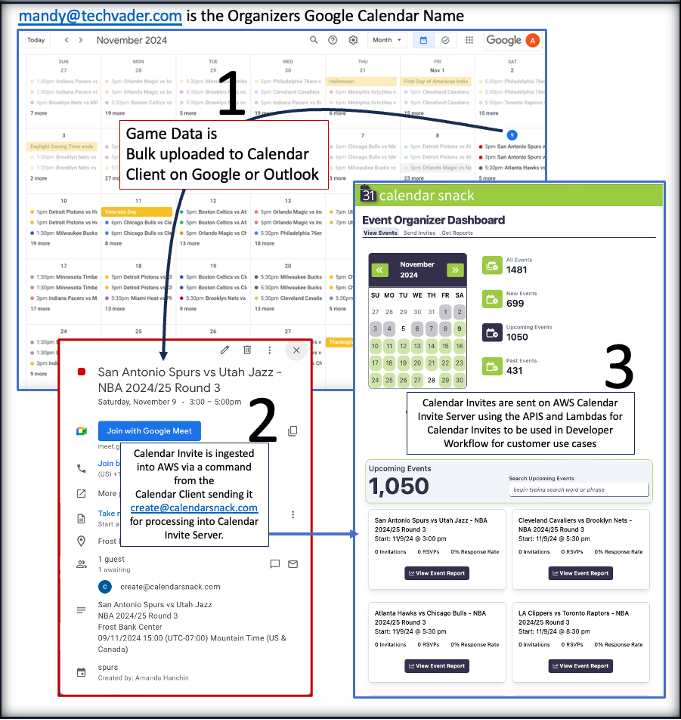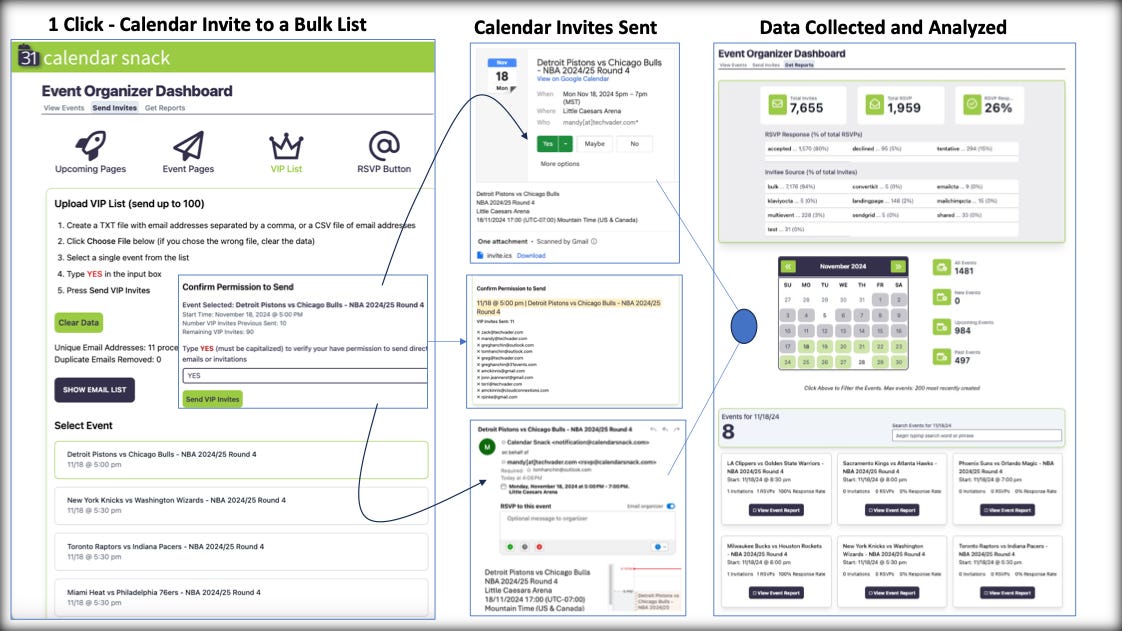Is sending millions of Calendar Invites legal?
Of course it is. Billions are sent everyday.
Technical Whitepaper:
Challenges and Solutions in Virtualizing Calendar Events to Create an Invite-Sending Service
Abstract/Overview
This whitepaper explores the technical challenges of virtualizing events from a calendar and transforming them into ready-made invites that are compliant, cross-platform, and actionable. It is tailored for a technical audience familiar with email and messaging platforms, AWS services like SES, DynamoDB, APIs, and Lambda, but less experienced with the ICS/iCal specification. We discuss the complexities of ICS/iCal generation, data extraction, updates, time zone management, reminders, and ensuring privacy in invite sending. Additionally, we highlight our decision to focus on single-event functionality. These insights reveal the development hurdles and solutions behind creating a scalable, production-ready invite-sending service.
Introduction
Calendar invites have become an integral part of modern communication. Their ability to deliver time-sensitive information directly into recipients' calendars makes them a powerful tool for engagement. However, building a system to virtualize calendar events and turn them into invites that work seamlessly across platforms involves significant technical challenges.
Our solution focuses on single-event virtualization, enabling precise communication to invitees who have opted in or provided permission. This approach ensures compliance with industry standards while prioritizing simplicity and usability.
Core Challenges in Virtualizing Calendar Events
1. Data Extraction and Parsing
Extracting event data from a calendar and converting it into a structured format involves several challenges:
Inconsistent Platform Standards: Google Calendar, Microsoft Outlook, and Apple Calendar each have unique implementations of ICS/iCal standards, resulting in subtle differences that can cause invites to fail or display incorrectly.
Event Details: Essential attributes such as event subject, location, start and end times, time zones, and descriptions must be accurately extracted and stored in a database while maintaining compatibility with ICS/iCal.
Update Handling: Event updates require re-parsing and synchronizing changes without introducing errors or sending redundant notifications.
Solution
We leverage the organizer's existing calendar system (Google or Microsoft) to create events and add a designated invitee for processing. Once received:
Data Extraction: Event details are parsed and stored in a DynamoDB table, ensuring a consistent data structure.
Standardization: Data is normalized to conform with ICS/iCal standards for cross-platform compatibility.
2. ICS/iCal Generation
Generating an ICS/iCal file that works seamlessly across platforms is a nuanced process. Challenges include:
Compliance: Ensuring that generated ICS files conform to industry standards to avoid display errors in target calendar systems.
Multi-Platform Behavior: Handling platform-specific quirks, such as how updates are processed or how attachments are displayed.
Dynamic Updates: Generating updated ICS files that maintain event integrity without overwriting or duplicating existing data.
Solution
Our system dynamically generates ICS/iCal files based on stored event data. The file includes all required fields and formatting for cross-platform consistency, ensuring:
Correct rendering in inboxes and calendars.
Persistent reminders unless explicitly declined by the invitee.
3. Timezone Management
Timezones add significant complexity due to regional variations, daylight saving time shifts, and inconsistencies in how platforms handle time offsets.
Solution
To eliminate this complexity, all DATETIME values are normalized to UTC during data extraction and storage. Conversions to local time are handled dynamically at the recipient's calendar level, ensuring:
Accurate scheduling across time zones.
Simplified event management without relying on dynamic time zone calculations during processing.
4. RSVP and Update Tracking
Tracking invitee responses (RSVPs) and updates adds another layer of complexity:
Response Parsing: Responses must be parsed and linked to the correct invitee record.
Action Logging: Historical tracking of RSVPs, reminders, and updates for each event-invitee pair.
Notification Accuracy: Updates must only target invitees who have not declined the event.
Solution
RSVPs and updates are processed using a similar extraction workflow as event creation. Each invitee's status is logged in a dedicated record, ensuring:
Real-time visibility into RSVP status.
Accurate targeting for event updates.
5. Reminder Functionality
The ICS/iCal specification includes a section for reminders (VALARM), but its implementation varies widely across calendar applications:
Platform Discrepancies: Different platforms handle reminders inconsistently, and some may not fully support the industry standard.
Limited Usability: Advanced reminder configurations are often unsupported, leading to unpredictable behavior.
Solution
To avoid reliance on inconsistent reminder functionality, we limited the use of VALARM to its most rudimentary purpose—a single reminder. Instead, we focused on ensuring event updates could reliably:
Be recognized and processed to update event data.
Automatically trigger re-sending of invites to the event's invitee list, ensuring all participants receive accurate and updated information.
This approach prioritizes consistent communication and bypasses platform-specific limitations in reminder handling.
6. Privacy in Individual Invite Sending
Sending invites to individual email addresses without exposing Personally Identifiable Information (PII) of other invitees is a critical challenge:
Data Isolation: Ensuring each invite is sent to a single recipient without revealing details about other invitees.
Invitee-Specific Tracking: Maintaining a separate tracking record for each invitee while preserving event integrity.
Solution
We designed the system to:
Focus on Single Sends: Each invite is sent individually to a specific email address, ensuring no other invitees' information is included.
Track Invitee Records Separately: Each event-invitee pair is stored as an independent record in DynamoDB, allowing for granular tracking of responses and updates.
This design enhances privacy and ensures compliance with data protection regulations while maintaining the flexibility to update event details for all active invitees.
Design Decisions
1. Focus on Single Events
Our system focuses exclusively on single-event virtualization, foregoing support for recurring events. This decision was made to:
Simplify Development: Recurring events introduce complexities in tracking individual instances and managing updates.
Enhance Communication: Single-event functionality allows us to prioritize high-value, time-sensitive communication for invitees who have opted in or provided explicit permission.
2. Modular Architecture
The system's modular design enables flexibility and scalability:
Event Virtualization: Events are decoupled from the organizer's calendar after extraction, stored as independent records in DynamoDB.
API-Driven Processing: Invite sending and updates are triggered via APIs, allowing integration with other systems or workflows.
Key Benefits of Our Approach
Cross-Platform Compatibility
Seamless functionality across Google, Microsoft, Apple, and other calendars.
Persistent Engagement
Events remain visible in invitees' calendars, providing built-in reminders.
Dynamic Updates
Changes to events are automatically reflected for invitees who have not declined.
Scalability
AWS-powered infrastructure ensures the system can handle high volumes of events and invitees.
Privacy-Focused Design
Individual invites prevent the sharing of PII and ensure compliance with data protection standards.
Simplicity for Organizers
Adding a single invitee to an event triggers the entire virtualization and invite-sending process.
Conclusion
Virtualizing calendar events into ready-made invites is a technically challenging process, requiring deep expertise in ICS/iCal compliance, data extraction, time zone management, reminder functionality, and privacy protection. By focusing on single-event functionality and leveraging a modular, API-driven architecture, our system overcomes these challenges to deliver a robust, production-ready invite-sending service.
This approach not only ensures compatibility and scalability but also lays the foundation for future enhancements, such as dynamic event creation via webhooks or API integrations. For organizations seeking a proven solution to engage customers through calendar-based communication, our system represents a powerful, ready-to-deploy option.
Socials
https://www.youtube.com/@calendarinvite
https://medium.com/calendarsnack-com
Our Software
NFL Demo - https://tinyurl.com/2r927msu
NBA Demo - https://tinyurl.com/mpnmywpe





